Charles Edward Anderson Berry
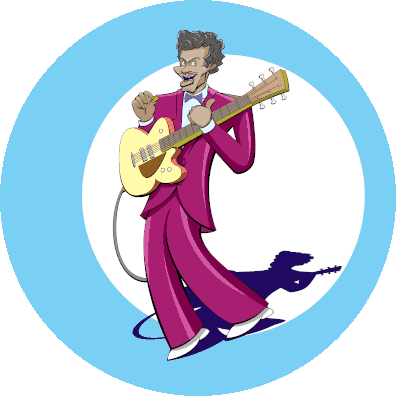
(Click on the image to zoom in.)
At some point everyone listens to a song that they enjoyed when they were kids and wonders. "Cripes!" they say. "Did I really listen to החרא הזה ?"
I mean, c'mon. Don't you snicker a bit when you listen to "Dead Man's Curve" (Jan and Dean), "Bread and Butter" (The Newbeats), "Lollipop" (The Chordettes), and (bleah) "Last Kiss" by J. Frank Wilson. Even high minded songs like "Eve of Destruction" (Barry McGuire) today come off a bit, well, hokey.
But there's no such complaints when reviewing the songs of Chuck Berry. Chuck's songs sounded good then and they sound good now. "Maybellene", "Memphis, Tennessee", "Nadine", "Roll Over, Beethoven" and of course, "Johnny B. Goode" which in 1958 hit #8 on Billboard's Top 100 - a nice ranking for what was still called Rhythm and Blues.
Chuck was born in St. Louis in 1926 to Harry and Martha Berry. As was common for the time the family lived in a segregated neighborhood. But as wasn't common the community was largely autonomous and Chuck said for his first three years, he didn't realize there were white people. Then when some firemen came into the neighborhood to put out a fire, Chuck said that his dad had to explain that they were just white people and they always looked like that.
As was true for most African American families in the early 20th century, the influence of the church on the Berry family was strong. They all were regular church goers at the Antioch Baptist Church where Harry was a deacon. Chuck's first musical training was singing in the choir.
Chuck's background was solidly middle class. His dad earned a good living as a carpenter and his uncle was a photographer. Chuck even attended a private high school where in a talent contest he sang Jay McShann's famous "Confessin' the Blues". He won the contest even though the blues weren't considered quite proper for a school function. All in all Chuck had a good upbringing for pursuing a successful and mainstream career.
Well, he had a good upbringing, sure, but Chuck's cantankerous side soon won out. To say he got off to a rocky start is like saying the Titanic had a bit of a delay on its way to New York. One telling is that Chuck and two friends were planning to go to California. So needing a road stake and transportation, they held up a liquor store and stole a car. Another version is that he and his friends found a gun in a parking lot and just started sticking people up.
Whatever the circumstances, the kids were quickly nabbed and Chuck ended up serving 3 years of a 10 year sentence in the Intermediate Reformatory for Young Men at Algoa. That's about six miles east along the Missouri River from the Missouri State Penitentiary at Jefferson City. Jeff City was known for at one time housing some celebrity criminals. These included Charles Arthur "Pretty Boy" Floyd" and Blanche Barrow, wife of Buck Barrow, the brother of Clyde. The prison shut down in 2004 (it's now a tourist attraction) but the Algoa unit is still there as the minimum security Algoa Correction Center. Chuck got out when he was 21.
It would be nice to say Missouri's rehabilitation program "straightened him out" to use a phrase beloved of the follicularly challenged in quaint regions of the American Southwest. Unfortunately Chuck's fans know that he continued to have run-ins with the law well after he had achieved fame as a rock and roll star. In 1960 he started a second stint in prison although Chuck steadfastly maintained his innocence. He said he had simply met the young lady in Mexico and gave her a job as a waitress in his nightclub and there was nothing more than that. But the authorities (and the all-white jury) didn't believe the story and the judge sentenced him to 5 years in prison. Chuck was paroled after less than two years (some stories say the time served was 18 to 20 months). But legal problems continued to bedevil his career and in the late 1970's Chuck spent another four months in prison for income tax evasion. His fellow rock and roll pioneer Carl Perkins said Chuck's problems made him a cold and distant and even bitter man.

Carl Perkins
A Friend
But you wouldn't know that from Chuck's performing persona which always was cheerful and exuberant. When he got out of Algao he moved back home and began working at various jobs. But he also began playing guitar in the nightclubs around St. Louis and acquired considerable proficiency. His music was what we'd call rockabilly. Although today rockabilly is one of the many subgenres of country and western music, at the time it was all lumped in with what was called "hillbilly". By 1952, Chuck was playing in the better venues around town and began writing his own songs.
Of course, sticking around one town puts limits on performing artists' opportunities and Chuck would take out on the road. In 1955 he was in Chicago where he met Muddy Waters (known to his friends and family as McKinley Morganfield). Muddy said Chuck should go to one of the local record companies and show them what he could do. So Chuck took his song "Maybellene" - that's the way he spelled it - to Chess Records. The Chess brothers liked what they heard and released "Maybellene" as a single. It rose to #5 on Billboard's Top 100 and climbed to #1 on the charts of the new genre called Rhythm and Blues.
Perhaps it's just the nature of critics when writing about people who aren't yet legendary but their praise for Chuck was tempered with condescension. Chuck was an "amusing novelty", they said, and his songs were "jockey and juke wax". That is, they were mostly suitable for playing on the radio and on the juke boxes.1 Some critics would smilingly comment on the "humor" of Chuck's songs.
Footnote
Jukeboxes were automated music playing devices set up in public locations and were common from the 1930's up to the 1980's. After 1949, a typical "box" would hold about fifty of the old style "45 platters" for a total of 100 songs. By necessity jukeboxes were large - five feet tall was common, nearly as wide, and perhaps two feet deep - and some had glittering pulsating lights for reasons no one can quite fathom.
To play a jukebox you would insert a coin - a nickel, dime, or a quarter - into a slot and push buttons with the names of the songs you wanted to hear. You could queue up as many songs as you wanted.
Most jukeboxes had a large glass window where you could see the rows or stacks of records. You could watch the mechanical arm move along and pull out the selected record. The arm would place the record on a turntable and the record would then play.
Although now largely vanished except in specialist nostalgia establishments, there was a time when scarcely a restaurant or cafe didn't have its jukebox. But with the onset of the digital age when people could carry a library of recordings literally in their pockets, this venerable institution faded and came to an end.
That there was a racial element in keeping Chuck in the background can't be denied as this was a time when record companies would take songs written and performed by black artists and substitute "cover" versions by white musicians. For instance, Little Richard's "Tutti Frutti" had a version by - get this - Pat Boone, and to be honest Pat's rendition sounds rather silly. The timing of the releases was specifically designed to keep the black artists from reaching the mainstream audiences. Helene Dixon's recording of Chuck's song, "Roll Over Beethoven" (which actually isn't that bad) was released the same week as Chuck's. However, by the mid-50's and through the efforts of disc jockeys like Alan Freed the original rock and roll songs were being bought by the kids albeit to the angst of their parents.
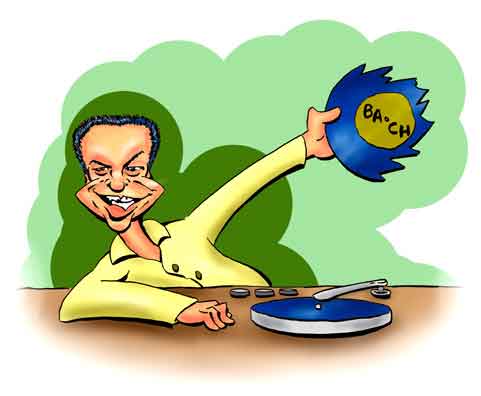
Alan Freed
He made an effort.
One promoter of the original music of black performers was none other than Ed Sullivan whose Sunday night variety show reached millions of television viewers during its run from 1948 to 1971. Against all wisdom (and some say against his sponsor's wishes) Ed featured popular black musicians from the beginning. These included the now icons like Nat King Cole, Sammy Davis Jr., Pearl Bailey, the Supremes, Gladys Knight, Della Reese, Ella Fitzgerald, Eartha Kitt, and Sarah Vaughan.
Chuck never appeared on Ed's really big shew. Probably his songs had too much of the hard rock edge. Certainly Ed was adamant that all artists choose songs that avoid any hint of controversy and if they slipped something adverse in - the show was live - Ed considered it an act of betrayal. When Bo Diddley appeared he planned to play his signature song "Bo Diddley". Although there's nothing really improper in the song, just before airtime, Ed told Bo that instead he had to substitute "Sixteen Tons", which had been a massive hit when sung by the eminently respectable Tennessee Ernie Ford. Since Bo didn't know the song, Ed had cue cards made up with the lyrics.
But once he went on, the air Bo went ahead and sang "Bo Diddley". Afterwards, Ed expressed much choler about what he said was a "double-cross". He swore that Bo would never be on television again. And indeed it was another decade before Bo reappeared on the small screen.
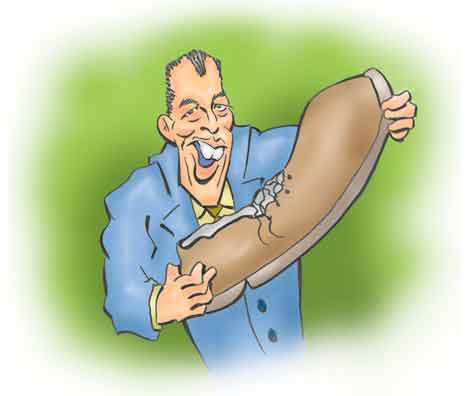
Ed Sullivan
A Really Big Shew with ...
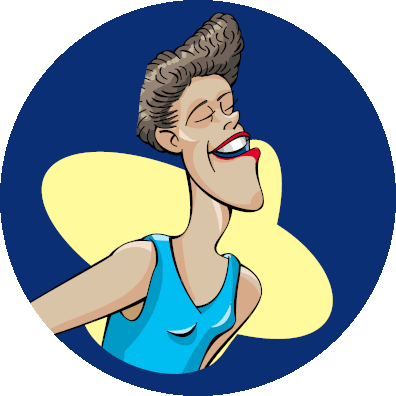
...Sarah ...
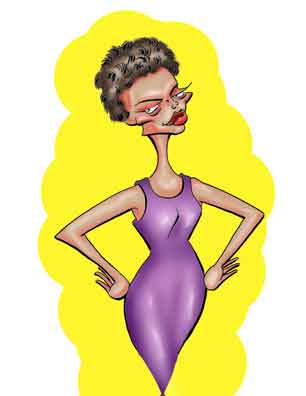
..Eartha...

... and Bo.
It's often forgotten that up to the early and mid-1960's, rock and roll was considered the least honorable of music. Secondary music teachers would sneer at the rotten tastes of young people who preferred Elvis Presley, Rickey Nelson, Fabian Forte (and Chuck Berry!) over - quote - "music" - unquote - by popular artists like Richard Wagner, Pyotr Tchaikovsky, Johannes Brahms, and Igor Stravinsky, whoever they were. Admittedly sometimes the complaints didn't make much sense. One teacher from a Quaint American Southwestern State who once grumped to his students about the horrible music his students preferred was also a big fan and even a performer of be-bop. A strange criticism since it was be-bop that drove many young people away from jazz to rock and roll.
And then in 1964 a group of four young men from Liverpool came across the water to appear on, yes, the Ed Sullivan Show. Although the initial reactions tended to be negative - why, some critics ask, did we have to import nuts when we had plenty already - in a few years the songs of the Fab Four were being sung and played by everyone, including some major symphony orchestras. Leonard Bernstein, the conductor of the New York Philharmonic, went on record to say there was indeed good rock and roll.
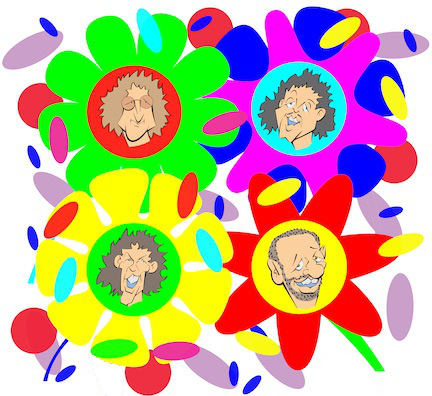
The Fab(ulous) Four
And when asked where they got their music, the Liverpool quartet pointed out that in England it wasn't the goody-two shoes squeaky-clean artists that the aspiring Albions went to for inspiration. Instead they all turned to the original rhythm and blues singers like Chuck Berry. And in their earliest concerts they were sure to perform some of Chuck's best songs like "Roll Over Beethoven" and "Rock and Roll Music".
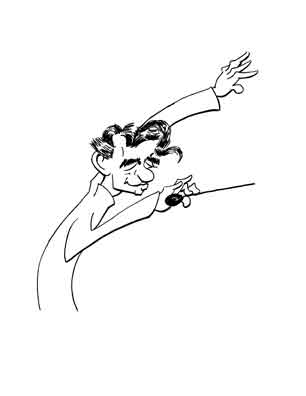
Lenny
He said some was good.
Chuck did better than some of the original R&B performers. He broached the Top Ten of Billboard's Hot 100 a total of six times. But in his heyday he never reached #1. That didn't happen until 1972 with - yes - a "novelty" and "humorous" tune replete with double entendres, "My Ding-a-Ling".
But for reasons of some complexity, by the later years of the 1960's, country music was on its way to be a full competitor with rock ("rock and roll" is now a largely historical term) and indeed was even pushing it aside. Part of the resurgence of "hillbilly" music was because the little known secret that any difference between rock and country music is more a matter of presentation than the music. Changing from rock to country can be as simple as changing your apparel.
Chuck certainly could have made the transition to country - which in someways would be returning to his roots. With his clear tenor and middle western accent, he could have easily joined the early rockers like Conway Twitty, Leon Russell, Kenny Rogers, John Fogarty, and others to see the light and cross the aisle.
By the late 1960's country music really hit the big time when it garnered its own television show. Yes, rock and roll and folk music had their own programs with Shindig! and Hootenanny, but these series lasted only a scant two or three years. But Hee Haw was first broadcast in 1969 and was on the air for 23 seasons. After a stint of re-runs the show finally shut down in 1997.
And the first song ever performed on Hee Haw?
Not just one of the first songs, but THE FIRST.
Well, it was played by co-host Buck Owen with his Buckeroos.
And what did they play? "Act Naturally"? "Think of Me"? "I've Got a Tiger by the Tail"?
Nope. It was "Johnny B. Goode".
References and Further Reading
Chuck Berry: The Biography, John Collins, Aurum Press, 2002.
"Chuck Berry", Biography, April 2, 2014 (Revised: March 26, 2021).
"Chuck Berry’s Quiet 1950s Revolution: Dispatches From the Pages of Billboard’s Past", Joe Lynch, Billboard, March 18, 2017.
"Chuck Berry", Second Hand Songs.
"12 Things You Didn’t Know About Chuck Berry", J. D. Nash, American Blues Scene, April 9, 2020.
"Mrs. Chuck Berry Breaks Down as Husband Is Convicted", Jackson [Mississippi] Advocate, March 19, 1960, p. 1., Chronicling America, Library of Congress.
"The Jukebox Story: Rise and Fall", Ken Dowell, Off the Leash, May 2, 2020.
"Face au public", Chuck Berry (Performer), Serge Leroy (Director), Radio Télévision Belge Francophone, May 11, 1965.